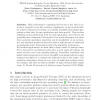Free Online Productivity Tools
i2Speak
i2Symbol
i2OCR
iTex2Img
iWeb2Print
iWeb2Shot
i2Type
iPdf2Split
iPdf2Merge
i2Bopomofo
i2Arabic
i2Style
i2Image
i2PDF
iLatex2Rtf
Sci2ools
114
Voted
MICCAI
2002
Springer
2002
Springer
Robust Registration of Multi-modal Images: Towards Real-Time Clinical Applications
Abstract. High performance computing has become a key step to introduce computer tools, like real-time registration, in the medical field. To achieve real-time processing, one usually simplifies and adapts algorithms so that they become application and data specific. This involves designing and programming work for each application, and reduces the generality and robustness of the method. Our goal in this paper is to show that a general registration algorithm can be parallelized on an inexpensive and standard parallel architecture with a mall amount of additional programming work, thus keeping intact the algorithm performance. For medical applications, we show that a cheap cluster of dual-processor PCs connected by an Ethernet network is a good trade-off between the power and the cost of the parallel platform. Portability, scalability and safety requirements led us to choose OpenMP to program multi-processor machines and MPI to coordinate the different nodes of the cluster. The resulti...
General Registration Algorithm | Medical Imaging | Medium Resolution Images | MICCAI 2002 | Standard Parallel Architecture |
| Added | 15 Nov 2009 |
| Updated | 15 Nov 2009 |
| Type | Conference |
| Year | 2002 |
| Where | MICCAI |
| Authors | Radu Stefanescu, Sébastien Ourselin, Xavier Pennec |
Comments (0)

